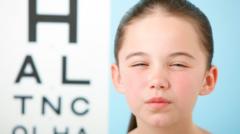Children's eyesight is steadily getting worse with one in three now short-sighted or unable to see things in the distance clearly, a global analysis suggests. The researchers say Covid lockdowns had a negative impact on eyesight as children spent more time on screens and less time outdoors. Short-sightedness, or myopia, is a growing global health concern which is set to affect millions more children by 2050, the study warns.
The highest rates are in Asia - 85% of children in Japan and 73% in South Korea are short-sighted with more than 40% affected in China and Russia. Paraguay and Uganda, at about 1%, had some of the lowest levels of myopia, with the UK, Ireland and the US all about 15%. The study, published in the British Journal of Ophthalmology , looked at research involving more than five million children and teenagers from 50 countries across all six continents.
Their number-crunching revealed that short-sightedness tripled between 1990 and 2023 - rising to 36%. And the increase was "particularly notable" after the Covid pandemic, the researchers say. Myopia usually starts during primary school years and tends to worsen until the eye has stopped growing, at about 20 years of age.
There are factors that make it much more likely - living in East Asia is one of those. It is also down to genetics - the traits children inherit from their parents - but there are other factors too, such as the particularly young age (two years old) that children start their education in places.


















